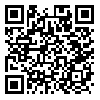1. Manning SE, Wang H, Dwibedi N, et al. Association of multimorbidity with the use of health information technology. Digital Health. 2023;9:20552076231163797 [
DOI]
2. Taneja D, Kulkarni SV, Sinha S, Dindigal RN. Digital technology in hospital administration: a strategic choice. The Journal of the Association of Physicians of India. 2023;71(10):83-8 [
DOI]
3. Ismail A, Jamil AT, Rahman AFA, et al. The implementation of hospital information system (HIS) in tertiary hospitals in malaysia: a qualitative study. Malaysian Journal of Public Health Medicine. 2010;10(2):16-24 [
DOI]
4. Theo L, Sauerborn R, Bodart C. Design and implementation of health information systems. Geneva: World Health Organization. 2000 [
DOI]
5. Shojaei Baghini M, Naseri Boori Abadi T, Joodaki M, Mollaee S. Progress of hospital information systems in Kerman teaching general hospitals in 2012. Journal of Modern Medical Information Sciences. 2015;1(1):42-50. [
DOI]
6. George NM, Drahnak DM, Schroeder DL, Katrancha ED. Enhancing prelicensure nursing students' use of an electronic health record. Clinical Simulation in Nursing. 2016;12(5):152-8. [
DOI]
7. Pfob A, Griewing S, Seitz K, et al. Current landscape of hospital information systems in gynecology and obstetrics in Germany: a survey of the commission digital medicine of the German society for gynecology and obstetrics. Archives of Gynecology and Obstetrics. 2023;308(6):1823-30 [
DOI]
8. Ahmed SS. The Relationship between nursing knowledge about documentation skills and auditing retrospective of patient's records. Helwan International Journal for Nursing Research and Practice. 2024;3(5):213-28. [
DOI]
9. Zhang L, Wu J, Yang J, et al. Development and application evaluation of a nursing simulation teaching information system based on hospital information systems. International Journal of Clinical Practice. 2023;2023(1):6334967 [
DOI]
10. Sivanjali M. The effectiveness of simulation-based learning in clinical education. Batticaloa Medical Journal. 2024;18(1). [
DOI]
11. Whitt KJ, Allen CL, Hogg CW, et al. The use of electronic health records in advanced practice nursing education: a scoping review. Journal of Professional Nursing. 2024;50:83-94 [
DOI]
12. McBride S, Thomas L, Decker S, et al. Validation of a tool to evaluate nursing students’ electronic health record competency in simulation. Nursing Education Perspectives. 2021;45(3):161. [
DOI]
13. Kobeissi MM. Enhancing simulation: a roadmap for integrating the electronic health record into the nurse practitioner curriculum. Clinical Simulation in Nursing. 2023;85:101460. [
DOI]
14. Choi J, Bove LA, Tarte V, Choi WJ. Impact of simulated electronic health records on informatics competency of students in informatics course. Healthcare Informatics Research. 2021;27(1):67-72. [
DOI]
15. Repsha C, Morse B, Lee SE, Katz J, Burrows E, Teates J. Use of a simulated electronic health record to support nursing student informatics knowledge and skills. Computers, Informatics, Nursing. 2020;38(2):55-9. [
DOI]
16. Zhang L, Wu J, Yang J, et al. Development and application evaluation of a nursing simulation teaching information system based on hospital information systems. International Journal of Clinical Practice. 2023;2023:6334967. [
DOI]
17. Nabovati E, Jeddi FR, Ghaffari F, Mirhoseini F. The effects of simulation training on learning of health information systems: A scoping review. Journal of Education and Health Promotion. 2022;11:4. [
DOI]
18. Gosa LK. Improving EMR Competency in First Year Nursing Students. 2022. [
DOI]
19. Raghunathan K, McKenna L, Peddle M. Baseline evaluation of nursing students’ informatics competency for digital health practice: A descriptive exploratory study. Digital Health. 2023:20552076231179051. [
DOI]
20. Alamro AA, Aljuma MS, Alateeq SS, et al. Challenges of health informatics systems in primary health care. Saudi Journal of Medical and Pharmaceutical Sciences. 2023;9(10):717-9 [
DOI]
21. Choi J, Woo S, Tarte V. Informatics competencies of students in a doctor of nursing practice program: a descriptive study. Healthcare Informatics Research. 2024;30(2):147-53 [
DOI]
22. Belchez CA. Informatics and faculty intraprofessional assessment and gap analysis of current integration of informatics competencies in a baccalaureate nursing program: University of Kansas; 2019. [
DOI]
23. Chikware AB, Roman NV, Davids EL. Improving health informatics competencies: a scoping review of the components of health informatics academic programs. SAGE Open. 2024;14(4):21582440241293259. [
DOI]
24. Al Najjar RI, Shafie ZM. Impact of nursing informatics on the quality of patient care. International Journal of Medical Science and Clinical Research Studies. 2022;2(5):418-21. [
DOI]
25. Otokiti A. Using informatics to improve healthcare quality. International Journal of Health Care Quality Assurance. 2019;32(2):425-30. [
DOI]
26. Coppersmith NA, Sarkar IN, Chen ES. Quality informatics: the convergence of healthcare data, analytics, and clinical excellence. Applied Clinical Informatics. 2019;10(02):272-7. [
DOI]
27. Aurore N, Valens M, Lune NJ, Nyssen M. Assessment of health informatics competencies in undergraduate training of healthcare professionals in Rwanda. Rwanda Journal. 2016;3(1):36-41 [
DOI]
28. Jeffery AD, Sengstack P. Teaching data science through an interactive, hands-on workshop with clinically relevant case studies. Applied Clinical Informatics. 2024;15(05):1074-9. [
DOI]
29. Hare AJ, Soegaard Ballester JM, Gabriel PE, Adusumalli S, Hanson III CW. Training digital natives to transform healthcare: a 5-tiered approach for integrating clinical informatics into undergraduate medical education. Journal of the American Medical Informatics Association. 2023;30(1):139-43. [
DOI]
30. Chang H. Recent movement on education and training in health informatics. Healthcare Informatics Research. 2014;20(2):79. [
DOI]
31. Wu H, Patel MK, Tan CC. The current landscape of cybersecurity training in CAHIIM accredited programs. In2024 IEEE 12th International Conference on Healthcare Informatics (ICHI) 2024 Jun 3 (pp. 750-752). IEEE. [
DOI]
32. Sapci AH, Sapci HA. Digital continuous healthcare and disruptive medical technologies: m-health and telemedicine skills training for data-driven healthcare. Journal of Telemedicine and Telecare. 2019;25(10):623-35. [
DOI]
33. Kleib M, Nagle L. Factors associated with Canadian nurses' informatics competency. Computers, Informatics, Nursing. 2018;36(8):406-15. [
DOI]





